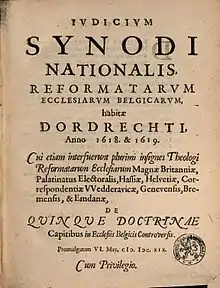Canons of Dort
The Canons of Dort, or Canons of Dordrecht, formally titled The Decision of the Synod of Dort on the Five Main Points of Doctrine in Dispute in the Netherlands, is the judgment of the National Synod held in the Dutch city of Dordrecht in 1618–1619.[1] At the time, Dordrecht was often referred to in English as in local dialects as Dort or Dordt.

Today the Canons of Dort form part of the Three Forms of Unity, one of the confessional standards of many of the Reformed churches around the world, including the Netherlands, South Africa, Australia, and North America. Their continued use as a standard sets apart the Reformed Churches from those adhering to the doctrines of Jacob Arminius, the Remonstrants.
These canons are a judicial decision on the doctrinal points in dispute in the Arminian controversy of that day. Following the death of Arminius (1560–1609), his followers set forth in 1610 the Five Articles of Remonstrance. The five articles formulated their points of departure from the Confessional Reformed beliefs of the Belgic Confession that they had sworn ministerial oaths to teach and uphold. The Canons of Dort represent the judgment of the Synod against this Remonstrance.[2] In later years, Arminian theology received official acceptance by the State and has since continued in various forms within Protestantism, especially within the Methodist churches.[3]
The canons were not intended to be a comprehensive explanation of Reformed doctrine, but only an exposition on the five points of doctrine in dispute.[4] The five points of Calvinism, remembered by the mnemonic TULIP[lower-alpha 1] and popularized by a 1963 booklet,[5] are popularly said to summarize the 1618 Canons of Dort.[6] While related to the 1618 Canons of Dort, the Five Points of Calvinism do not actually come from the 1618 document itself but from an earlier document and correction against the Arminians during the same controversy. The Five Points of Calvinism comes from the Counter Remonstrance of 1611[7]
Notes
- Total depravity, unconditional election, limited atonement, irresistible grace, and perseverance of the saints.
References
- Horton, Michael (2011). The Christian Faith. Grand Rapids, Michigan: Zondervan. p. 562. ISBN 978-0310286042.
- Peterson, Robert; Williams, Michael (2004), Why I am not an Arminian, Downers Grove, Illinois: InterVarsity Press, p. 124, ISBN 0830832483
- Olson, Roger E. (20 August 2009). Arminian Theology. InterVarsity Press. p. 14. ISBN 9780830874439.
Arminian theology was at first suppressed in the United Provinces (known today as the Netherlands) but caught on there later and spread to England and the American colonies, largely through the influence of John Wesley and the Methodists. The Canons of Dordt (or Dort) is still one of the Confessional documents taught and upheld in Reformed Churches today.
- "Canons of Dort". 4 June 2012.
- Stewart, Kenneth J. (2008). "The Points of Calvinism: Retrospect and Prospect" (PDF). Scottish Bulletin of Evangelical Theology. 26 (2): 189–193.
-
- R. C. Sproul (1997), What is Reformed Theology?, Grand Rapids: Baker Books, pp. 27–28.
- Chapter 3 of: Stewart, Kenneth J. (2011). Ten Myths about Calvinism. Downers Grove, Illinois: InterVarsity Press.
- Muller, Richard A. (2012). Calvin and the Reformed Tradition (Ebook ed.). Grand Rapids, Michigan: Baker Academic. pp. 50–51.
Further reading
- But for the Grace of God by Cornelis P. Venema
- The Golden Chain of Salvation by John Bouwers
- Unspeakable Comfort by Peter Feenstra
- The Voice of Our Fathers by Homer Hoeksema
- The Reformed Doctrine of Predestination by Lorraine Boettner
- The Synod of Dordt by Thomas Scott
- The Canons of Dordt by Henry Peterson
- The Five Points of Calvinism by David Steele and Curtis Thomas
- The Works of John Owen, Vol. 10
- TULIP by William Jay Hornbeck II
External links
- Christian Reformed Church: The Canons of Dort
- The Canons of Dort in Latin, Dutch, English, Russian and Ukrainian
- The Canons of Dort in Vietnamese Giáo Luật của Dordt (Dort) bằng Tiếng Việt
- Audio Recording of the Canons of Dort (mp3)